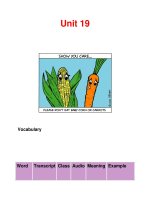TỪ VỰNG TOEIC unit 19
Bạn đang xem bản rút gọn của tài liệu. Xem và tải ngay bản đầy đủ của tài liệu tại đây (267 KB, 62 trang )
Unit 19
BIO GEN FUNCT MUT FRACT TELE PHIL NEG DEC CENT Number
Words
Quiz 19-1 Quiz 19-2 Quiz 19-3 Quiz 19-4 Quiz 19-5 Review Quizzes 19
BIO comes from the Greek word for “life,” and forms the base for many
English words. Biology, for instance, is the study of living forms and life
processes; the biosphere is the entire area of and above the earth where life
can exist; and biotechnology is the use of living organisms to create useful
products.
bionic
devices.
Made stronger or more capable by electronic or mechanical
• Bionic feet and hands for amputees have ceased to be mere sci-fi fantasies
and are becoming realities.
The science of bionics uses knowledge about how biological systems work to
help solve engineering problems. The material Velcro, for example, was
inspired by the way burrs behave when they stick to your clothes, and some
computer chips are now wired in ways that imitate the “wiring” of the brain
and nervous system. But in popular use, the adjective bionic almost always
describes artificial limbs or other bodily parts that work as much like real
ones as possible. A perfect bionic arm would move and function as easily as a
real arm—a goal we're rapidly getting closer to.
biopsy
The removal and examination of tissue, cells, or fluids
from a living body.
• Everyone felt relieved when the results of the biopsy showed the tumor
wasn't cancerous.
Matter examined in a biopsy is always taken from a living organism. Most
biopsies are done by using a needle to extract tissue or fluid, but some may
instead require cutting, and others may amount to nothing more than
swabbing the inside of the patient's cheek. Biopsies are best known as a
means of detecting cancer, but a doctor may also take a biopsy of heart
muscle to investigate suspected heart disease, for example, or perform a
biopsy on a pregnant woman to test for disorders in the fetus.
biodegradable
Able to be broken down into harmless
substances by microorganisms or other living things.
• Though the advertisements promised that the entire package was
biodegradable, environmentalists expressed their doubts.
In biodegradable, with its root grad, “to step or move,” and its prefix de“downward,” we get an adjective describing things that can be broken down
into basic substances through normal environmental processes. Animal and
plant products are normally biodegradable, but mineral substances such as
metals, glass, and plastics usually are not. Newly developed biodegradable
plastics are now appearing in numerous products. However, “biodegradable”
products can vary greatly in how long they take to break down. A loaf of
bread may require only a couple of weeks, and a piece of paper may vanish in
a couple of months, but some “biodegradable” plastic milk cartons may take
four or five years.
symbiosis
(1) The close living together of two different
forms of life in a way that benefits both. (2) A cooperative relationship
between two people or groups.
• The lichen that grows on rocks is produced by the symbiosis of a fungus
and an alga, two very different organisms.
With its prefix sym-, “with,” symbiosis expresses the notion of cooperation
between living things. Symbiotic associations are found throughout the plant
and animal world. You may have read, for instance, of the little blackbird
plover, which picks the teeth of the fierce African crocodile. Or the bird
called the African honeyguide, which leads a little mammal called the ratel to
a bees' nest, which the ratel, protected from the bees by its thick fur, then
breaks open, and both it and the honeyguide feast on the honey. Or even our
own bodies, which are home to millions of bacteria—especially the
bacterium E. coli in our intestines—and neither we nor E. coli could live
without the other. You can probably think of plenty of human relationships
that could be called symbiotic as well.
GEN, which comes from the Greek genos, meaning “birth,” has generated
dozens of English words. A set of genes, for instance, gives birth to a living
being. And a genealogy is a historical map of your family, showing how each
generation gave birth to the next.
genesis
Origin, beginning.
• The genesis of the project dates back to 1976, when the two young men
were roommates at Cornell University.
The traditional Greek name for the first and best-known book of the Bible is
Genesis, meaning “origin.” Genesis tells the stories of the creation, Adam
and Eve, Cain and Abel, Noah's ark, the Tower of Babel, Abraham and his
sons, and more—the stories that explain how the world and humanity were
created, as well as much about how humanity, and especially the descendants
of Abraham, relate to the rest of the world. Today we use genesis to refer to
the creative beginnings of much smaller things, but never unimportant ones.
generator
A machine by which mechanical energy is
changed into electrical energy
• The jungle settlement depended on a large generator, which provided
electricity for a couple of hours each morning and evening.
Generators work by rotating a coil of wire in a magnetic field, causing a
current to flow in the wire. A generator may be a huge spinning turbine
powered by water, wind, steam, gas, or nuclear reactions, which sends
electricity out through power lines to thousands of customers. But normally
when we use the word, we're thinking of a small machine powered by
gasoline or diesel, such as you might keep in your basement for those times
when a storm knocks out your power, to create electricity right in front of
your eyes. A special kind of generator called an alternator powers a car's
electrical system (including its lights, power steering, etc.) while the car is
running.
genre
Kind, sort; especially a distinctive type or category of
literature, art, or music.
• Opera was a new genre for her, since all her compositions up until then had
been songs and chamber music.
Genre, as you might guess from the way it sounds, comes straight from
French, a language based on Latin. It's closely related to genus, a word you
may have encountered in biology class. Both words contain the gen- root
because they indicate that everything in a particular category (a genre or a
genus) belongs to the same “family” and thus has the same origins. So the
main genres of classical music would include symphonies, sonatas, and
opera, and the major genres of literature would include novels, short stories,
poetry, and drama. But within the category of novels, we could also say that
detective novels, sci-fi novels, romance novels, and young-adult novels are
separate genres.
carcinogenic
Producing or causing cancer.
• Although she knows all too well that the tobacco in cigarettes is
carcinogenic, she's too addicted to quit.
It sometimes seems as if the list of carcinogenic substances gets longer every
day. A substance such as a food additive that's been in common use for years
may unexpectedly show signs of being carcinogenic in laboratory
experiments. When that happens, the suspected carcinogen will often have to
be withdrawn from the market. When a building material like asbestos turns
out to be a carcinogen, it may also have to be physically removed from
buildings. English has hundreds of other scientific words ending in -genic
(such as allergenic), and in almost all of them the ending means “causing.”
Quiz 19-1
A. Fill in each blank with the correct letter:
a. genre
b. symbiosis
c. carcinogenic
d. biodegradable
e. biopsy
f. genesis
g. bionic
h. generator
1. The ___ of the idea for his first novel lay in a casual remark by a stranger
one afternoon in the park.
2. Scientists are working on new ___ devices to enable amputees to do
detailed manual work.
3. Any insecticides that are known to be ___ have supposedly been banned
by the federal government.
4. Just about everything in our bodies is ___ except the fillings in our teeth.
5. She had a physical last week, and the doctor ordered a ___ of a suspiciouslooking patch of skin.
6. After 50 years of marriage, the ___ between them is just about total.
7. About once a year, an ice storm knocks out the electricity, and we haul out
the ___ to get everything going again.
8. She loved various kinds of classical music, but the string quartet was one
___ that she could never warm up to.
Answers
B. Indicate whether the following pairs have the same or different
meanings:
1. genesis / birth
same ___ / different ___
2. biopsy / life story
same ___ / different ___
3. generator / electricity-producing machine
same ___ / different ___
4. biodegradable / readily broken down
same ___ / different ___
5. carcinogenic / cancer-causing
same ___ / different ___
6. symbiosis / shared existence
same ___ / different ___
7. genre / animal group
same ___ / different ___
8. bionic / fantastic
same ___ / different ___
Answers
FUNCT comes from the Latin verb fungi, “to perform, carry out.” If your car
is functional, it's able to perform its function of providing transportation. But
a functional illiterate is a person who, for all practical or functional purposes,
might as well not be able to read or write at all.
functionary
(1) Someone who performs a certain
function. (2) Someone who holds a position in a political party or
government.
• He was one of a group of party functionaries assigned to do the dirty work
of the campaign.
For most of us, being described as a functionary wouldn't be a compliment.
The word refers especially to a person of lower rank, with little or no
authority, who must carry out someone else's orders. Bureaucrat is often a
synonym. However, functionary can also refer to the world beyond
government and offices; a character in a play, for example, could be called a
functionary if it was obvious that her sole function was to keep the plot
moving.
malfunction
manner.
To fail to operate in the normal or usual
• An examination of the wreck revealed that the brakes may have
malfunctioned as the truck started down the hill.
A malfunctioning switch might keep us from turning on a light. A
malfunctioning heart valve might require replacement with an artificial valve,
and if your immune system malfunctions it may start to attack healthy cells.
And a malfunction in a voting machine could result in hundreds of votes
being miscounted.
defunct
No longer, living, existing, or functioning.
• The company, which had once had annual sales of $150 million, was now
defunct.
If you know that de- often means “the opposite of” (see DE), it's easy to
guess the meaning of defunct. Shakespeare seems to have been the first writer
to use this adjective, in Henry V. Defunct American political parties include
the Greenback Party, the Readjuster Party, and the Nullifier Party. Defunct
Academy Awards categories include Best Dance Direction and Best Assistant
Director. Defunct U.S. auto models include the Dudly Bug, the LuLu, the
Hupmobile, the Gas-au-lec, and the Nu-Klea Starlite. But to speak of a
person as defunct would sound disrespectful—which is how it sounds in e. e.
cummings's famous poem “Buffalo Bill's defunct.”
dysfunctional
(1) Showing abnormal or unhealthy
behaviors and attitudes within a group of people. (2) Being unable to function
in a normal way.
• A psychologist would call their family dysfunctional, but even though
there's a lot of yelling and slamming of doors, they seem pretty happy to me.
Dysfunctional and dysfunction have been used for almost a hundred years,
often in medical writing (“brain dysfunction,” “a dysfunctional liver”) but
also by social scientists (“a dysfunctional city council,” “diplomatic
dysfunction”). But they only really entered the general vocabulary in the
1980s, when therapists and talk-show hosts began talking about dysfunctional
families. The signs of family dysfunction turned out to be numerous, and it
soon began to seem as if pretty much all our families could be called
dysfunctional.
MUT comes from the Latin mutare, “to change.” Plenty of science-fiction
movies—Godzilla, The Fly, The Incredible Shrinking Man—used to be made
on the subject of weird mutations, changes in normal people or animals that
usually end up causing death and destruction. What causes the unfortunate
victim to mutate may be a mysterious or alien force, or perhaps invisible
radiation. Though the science in these films isn't always right on target, the
scare factor of an army of mutants can be hard to beat.
commute
(1) To exchange or substitute; especially to change a
penalty to another one that is less severe. (2) To travel back and forth
regularly.
• There was a public outcry at the harshness of the prison sentence, and two
days later the governor commuted it to five years.
When you commute between a suburb and a city, you're “exchanging” one
location for another. When a chief executive substitutes a life sentence for the
death sentence handed down by a court, he or she is commuting the original
sentence. Most such commutations are the result of the prisoner's good
behavior. A commutator is a device in many electric motors that regularly
changes alternating current to direct current.
immutable
Not able or liable to change.
• Early philosophers believed there was an immutable substance at the root of
all existence.
Mutable means simply “changeable,” so when the negative prefix im- is
added we get its opposite. In computer programming, an immutable object is
one that can't be changed after it's been created. In a constantly changing
world, people who hunger for things as immutable as the laws of nature may
try to observe an immutable moral code and set of values. Unfortunately,
immutability isn't a basic quality of many things in this world.
permutation
rearrangement, variation.
A change in the order of a set of objects;
• They had rearranged the rooms in the house plans four or five times already,
but the architect had come up with yet another permutation.
There are six permutations of the letters A, B, and C, selected two at a time:
AB, AC, BC, BA, CA, and CB. As you see, order is important in
permutations. (By contrast, there are only three combinations: AB, AC, and
BC.) Permutation is an important concept in mathematics, especially in the
field of probability. But we can use the word more generally to mean any
change produced by rearranging existing parts without introducing new ones.
Some soap operas, for example, love permutations; the cast of regulars is
constantly being rearranged into new pairs, and even triangles.
transmute
(1) To change in shape, appearance, or nature,
especially for the better; to transform. (2) To experience such a change.
• Working alone in his cluttered laboratory in 15th-century Milan, he spent
twenty years searching for a method of transmuting lead into gold.
Transmutation changes something over into something else. Thus, a writer
may transmute his life into stories or novels, and an arranger might transmute
a lively march tune into a quiet lullaby. In the “Myth of Er” at the end of
Plato's Republic, for example, human souls are transmuted into the body and
existence of their choice. Having learned from their last life what they do not
want to be, many choose transmutation into something that seems better. A
meek man chooses to be transmuted into a tyrant, a farmer into a dashing (but
short-lived) warrior, and so on. But very few seem to have learned anything
from their former life that would make their choice a real improvement.
Quiz 19-2
A. Choose the closest definition:
1. defunct
a. dead b. depressed c. defective d. deserted
2. permutation
a. evolution b. rearrangement c. approval d. inflation
3. functionary
a. bureaucrat b. hard worker c. activist d. executive
4. transmute
a. reconsider b. send away c. silence d. convert
5. dysfunctional
a. untrained b. divorced c. performing poorly d. unfamiliar
6. immutable
a. unchangeable b. immature c. noisy d. defiant
7. malfunction
a. work slowly b. work improperly c. work efficiently d. work
mechanically
8. commute
a. deposit b. invest c. discuss d. change
Answers
B. Complete the analogies:
1. hostile : friendly :: immutable : ___
a. changeable b. decaying c. breathable d. out of date
2. wounded : healed :: dysfunctional : ___
a. lame b. healthy c. crippled d. unsteady
3. permit : allow :: commute : ___
a. review b. claim c. substitute d. send
4. healthy : vigorous :: defunct : ___
a. brainless b. failed c. strong d. unhappy
5. order : sequence :: permutation : ___
a. addition b. notion c. rearrangement d. removal
6. soldier : army :: functionary : ___
a. anthill b. stadium c. vacation d. organization
7. transmit : send :: transmute : ___
a. transit b. transform c. transfer d. transport
8. misbehave : scold :: malfunction : ___
a. function b. fix c. exchange d. rearrange
Answers
FRACT comes from the Latin verb frangere, “to break or shatter.” A
fraction is one of the pieces into which a whole can be broken, and a fracture
is a break in a wall, a rock, or a bone.









